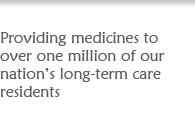|
August 29, 2006 | IN THIS ISSUE:
WLF Sues CMS Over Nursing Home Part D Restrictions
The Washington Legal Foundation held a press conference today to discuss a lawsuit it has filed against CMS. The lawsuit charges CMS’ prohibition on long term care providers recommending Medicare Part D plans to nursing home residents is an unconstitutional violation of First Amendment. Below is WLF’s press release regarding their lawsuit. A copy of the lawsuit and a link to a webcast of the press conference is available at http://www.wlf.org
WLF FILES SUIT AGAINST CMS, CHARGING THAT CMS SPEECH SUPPRESSION VIOLATES FIRST AMENDMENT
(Washington Legal Foundation v. Leavitt)
The Washington Legal Foundation (WLF) has filed suit in U.S. District Court for the District of Columbia against CMS (the federal Centers for Medicaid and Medicare Services), alleging that CMS is trampling on First Amendment rights in seeking to suppress truthful speech regarding insurance coverage available to senior citizens under Medicare Part D. Part D is the recently enacted Medicare program that offers insurance for the cost of prescription drugs. WLF filed suit on behalf of members who, as a result of CMS’s actions, are unable to obtain accurate information about competing insurance providers. The suit seeks an injunction against continuation of CMS's policy.
WLF held a press briefing regarding its lawsuit on Tuesday, August 29, 2006. Speaking at the briefing were WLF Chief Counsel Richard Samp and V. Thomas DeVille of DeVille Pharmacies, Inc. in Dillsboro, Indiana. Samp and DeVille will discuss health-care problems created by CMS’s speech-suppression policies, and why those policies violate the First Amendment.
“By blocking access to information and advice about Part D, CMS is making it extremely difficult for WLF members to make informed choices regarding which insurance options best suit their needs,” said WLF’s Samp after filing WLF’s suit. “Ironically, the groups that CMS bars from providing truthful information – including nursing homes and pharmacies – are often the very groups that have the most knowledge regarding the needs of Medicare recipients and the intricate details relating to the benefits provided by Part D plans,” Samp said.
Congress adopted the new Part D prescription drug benefit program in 2003. The program provides that new entities, known as Prescription Drug Plans or “PDPs” are to offer choices in prescription drug insurance coverage to Medicare beneficiaries and compete for the patronage of each participant. Coverage under the PDPs began on January 1, 2006, with enrollment beginning on November 15, 2005. Medicare beneficiaries have numerous Part D plans to choose among – generally more than 40, and in some areas more than 80.
Coverage offered by the various PDPs vary widely. For example, each PDP sets its own monthly premium, the list of drugs for which coverage is available and/or for which coverage is denied without “prior authorization,” required co-payments, and any “quantity limit” on the number of pills for which coverage is provided. Accordingly, a Medicare recipient choosing among PDPs needs to know, for example, which PDPs offer coverage for drugs the recipient is regularly prescribed.
In Marketing Guidelines first issued in August 2005, CMS has imposed severe restrictions on the dissemination of information about PDPs – not only by the PDPs themselves, but also by other organizations and individuals involved in the health-care delivery field. For example, “providers” (a term broadly defined to include any health-care provider that has entered into a contractual relationship with a PDP, including pharmacists, doctors, hospitals, and nursing homes) are barred from giving advice to their patients regarding which PDP best suits the patients’ needs. The result is that Medicare beneficiaries – many of whom are ill-equipped to undertake the complex analysis necessary to understand available options – often cannot obtain meaningful advice regarding which plan best suits their needs.
WLF’s suit charged that by suppressing truthful speech about Part D options, CMS is violating the First Amendment rights of WLF members and supporters who wish to obtain such information. WLF charged that CMS’s rationales for its speech-suppression policies – including a concern that providers might accept kick-backs in return for recommending a particular PDP – do not justify its infringement on free speech rights. WLF noted that CMS may enforce antikickback statutes without suppressing speech. WLF asked the Court to enjoin CMS from continuing to bar providers from providing truthful information.
WLF is a public interest law and policy center located in Washington, with members and supporters nationwide. WLF often advocates before CMS and the Food and Drug Administration, and litigates against them in support of the health-care needs of all Americans. Among WLF’s litigation successes are a landmark case that established a First Amendment right to disseminate truthful information about off-label uses of FDA-approved products, and a recent appeals court decision establishing that terminally ill patients have a constitutional right of access to experimental drugs when no other treatment options are available.
* * *
The Washington Legal Foundation
|


